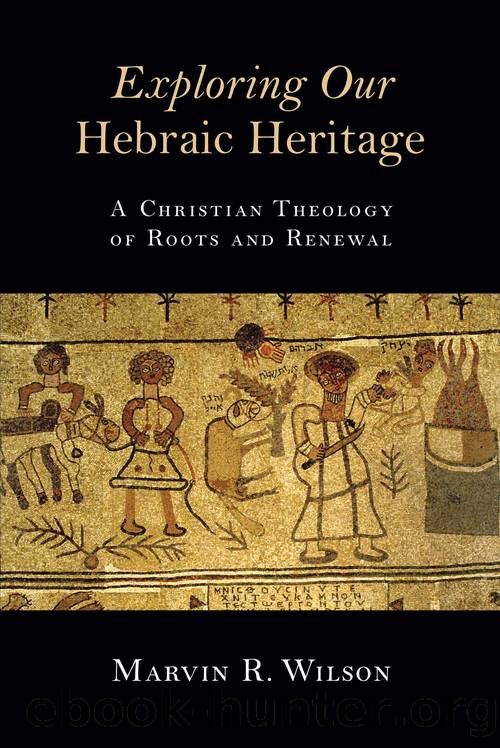Exploring Our Hebraic Heritage by Marvin R. Wilson

Author:Marvin R. Wilson
Language: eng
Format: epub
Publisher: Eerdmans
Published: 2014-05-16T00:00:00+00:00
David and the Divine Shepherd
In Ezekiel, the Lord, divine leader of Israel, is figuratively depicted as a shepherd (34:11-24). He searches for his sheep and looks after them and rescues them (vv. 11, 12). Under his guidance âthey will feed in a rich pasture on the mountains of Israelâ (v. 14). The Lord binds up the injured and strengthens the weak (v. 16a). He says, âI will shepherd the flock with justiceâ (v. 16b). The Lord also promises, âI will place over them one shepherd, my servant David, and he will tend themâ (v. 23). The reference in Ezekiel 34:23 is to a messianic leader, an ideal figure like the shepherd king David, who someday would rule as prince under the Lord.
David, the shepherd from Bethlehem who became king, writes, âThe Lord is my shepherdâ (Ps. 23:1).14 The language, however, is similar to the words of Davidâs ancestor Israel (Jacob) who speaks of the Almighty as
â[t]he God who has been my shepherd all my life to this dayâ (Gen. 48:15). These uses of the metaphor of shepherd remind us that as Israelites, David and Jacob were very familiar with the job description of shepherding.
In Psalm 23, Davidâs opening acknowledgment, âThe Lord is my shepherd,â makes the words of this psalm very personal. But these words have also proven reassuring for Jews and Christians over the centuries; they bring the Lordâs living concern for his people very much down to earth. The heavenly shepherd of Israel is someone to whom David can relate. He borrows most of his imagery in the psalm from the life of a shepherd, a life he knows well (1 Sam. 17:15). As this psalm indicates, David places great confidence in his divine shepherd-Âking. He is completely dependent on him. Because of the constant care of his shepherd, David lacks nothing (v. 1). His shepherd-Âleader provides all he needs for guidance, rest, and renewal of life (vv. 2-3). Even in the deepest darkness, David has no fear because his shepherd is with him to protect and comfort him (v. 4). The psalm affirms that the Lordâs steadfast love and active presence are with the psalmist throughout his life (v. 6). Davidâs shepherd is the same God who cares for us. Indeed, as Psalm 95:7 likewise affirms, âHe is our God and we are the people of his pasture, the flock under his careâ (see Ps. 100:3).
The metaphor of a divine Shepherd is rich and comforting to Jew and Christian alike. In a world in which wolves often prey on the helpless and vulnerable of the flock, the vigilant and daily care provided in the imagery of Yahweh the Shepherd gives encouragement and hope. Earthly shepherds are imperfect. Sometimes they are more interested in âfleecingâ the sheep than guiding, feeding, and protecting them. However, though a metaphor, the heavenly Shepherd personifies the very best of âshepherding.â With him, says David, âI lack nothingâ (Ps. 23:1).
Download
This site does not store any files on its server. We only index and link to content provided by other sites. Please contact the content providers to delete copyright contents if any and email us, we'll remove relevant links or contents immediately.
| Africa | Americas |
| Arctic & Antarctica | Asia |
| Australia & Oceania | Europe |
| Middle East | Russia |
| United States | World |
| Ancient Civilizations | Military |
| Historical Study & Educational Resources |
Cecilia; Or, Memoirs of an Heiress — Volume 1 by Fanny Burney(32549)
Cecilia; Or, Memoirs of an Heiress — Volume 2 by Fanny Burney(31948)
Cecilia; Or, Memoirs of an Heiress — Volume 3 by Fanny Burney(31932)
The Secret History by Donna Tartt(19061)
Sapiens: A Brief History of Humankind by Yuval Noah Harari(14372)
Leonardo da Vinci by Walter Isaacson(13320)
The Radium Girls by Kate Moore(12020)
Sapiens by Yuval Noah Harari(5366)
How Democracies Die by Steven Levitsky & Daniel Ziblatt(5216)
The Wind in My Hair by Masih Alinejad(5092)
Homo Deus: A Brief History of Tomorrow by Yuval Noah Harari(4909)
Endurance: Shackleton's Incredible Voyage by Alfred Lansing(4771)
Man's Search for Meaning by Viktor Frankl(4586)
The Silk Roads by Peter Frankopan(4527)
Millionaire: The Philanderer, Gambler, and Duelist Who Invented Modern Finance by Janet Gleeson(4472)
The Rape of Nanking by Iris Chang(4205)
Joan of Arc by Mary Gordon(4104)
The Motorcycle Diaries by Ernesto Che Guevara(4091)
Stalin by Stephen Kotkin(3960)
